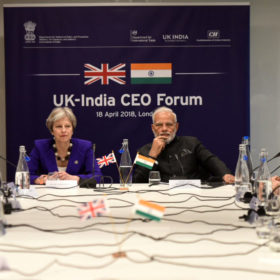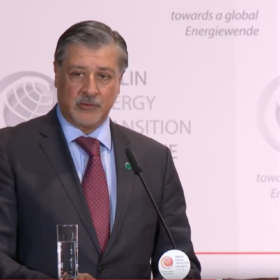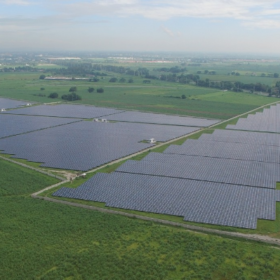Indian government mandates stringent quality controls for solar equipment
In a much-awaited move, India’s Ministry of New and Renewable Energy (MNRE) has mandated that, effective April 16, 2018, all solar PV manufacturers will have to register their equipment with the Bureau of Indian Standards (BIS).
UK, India strengthen solar ties with new commitments
The governments of the U.K. and India have announced a new green fund, managed by Lightsource BP and the Everstone Group, which will see up to £500 million invested in green energy in India. The U.K. has also joined the Indian-led International Solar Alliance (ISA).
IRENA: Renewables can account for up to two-thirds of total energy use, and 85% of power generation by 2050
In the latest edition of its long-term renewable energy outlook, the International Renewable Energy Agency (IRENA) calls for at least six-fold deployment of renewables by 2050, compared to the levels set out in current plans. Investment in low-carbon technologies needs to increase by around 30% to $120 trillion to enable the energy transition and avoid escalating stranded assets, the report finds.
2018: India second largest solar market on back of 113 GW global installations
With 11 GW, India is set to become the second largest solar PV market in 2018, usurping the U.S., as global demand reaches 113 GW, says IHS Markit. It adds that Q4 will be the biggest quarter in history for installations, with 34 GW expected.
Shell envisions central role for solar in new report
Shell’s new report shows a world where solar meets the largest portion of primary energy demand as soon as 2050.
ReNew Power acquires Ostro Energy in $1.54bn deal
According to the reports, Gurugram based developer ReNew Power Ventures has paid 40% in equity and the rest in debt for acquiring Actis LLP-backed Ostro Energy. With this acquisition, now ReNew Power’s combined renewable portfolio stands at 5.6 GW.
Partnership with the International Solar Alliance – GGGI Interview Part II
Dr. Frank Rijsberman, Director-General, Global Green Growth Institute (GGGI), South Korea, speaks to pv magazine about his recent participation in the International Solar Alliance founding ceremony held on March 11, 2018. He mentioned that in ISA member countries, correct energy policies, and risks in the investment are critical and need to be addressed.
India is key to world’s sustainable growth – GGGI Interview Part I
Dr. Frank Rijsberman, Director-General, Global Green Growth Institute (GGGI), South Korea, speaks to pv magazine about its ventures in the Indian solar and storage market. Rijsberman outlines that the country’s growing and diversifying economy, with its ambitious renewable targets, can help to capitalize on the demographic dividend. As a result, it can become the world’s primary consumer sustainable growth market.
Uttar Pradesh shows open access promise, finds Bridge to India
Uttar Pradesh (UP) has recently amended the Captive and Renewable Energy Regulations 2014 to provide 50% exemptions from transmission and wheeling charges for intra-state open access sale of solar power.
Solar tariffs in Gujarat rise to INR 2.98/kWh
In a recent auction of 500 MW solar PV in the state of Gujarat, solar tariffs have increased to INR 2.98 ($0.046)/kWh, as quoted by state-owned Gujarat State Electricity Corporation (GSEC) Ltd. The reason for the increased tariff rate is cited as pertaining to the uncertainties created by upcoming duties.












